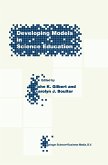Models and modelling play a central role in the nature of science, in its conduct, in the accreditation and dissemination of its outcomes, as well as forming a bridge to technology. They therefore have an important place in both the formal and informal science education provision made for people of all ages. This book is a product of five years collaborative work by eighteen researchers from four countries. It addresses four key issues: the roles of models in science and their implications for science education; the place of models in curricula for major science subjects; the ways that models can be presented to, are learned about, and can be produced by, individuals; the implications of all these for research and for science teacher education. The work draws on insights from the history and philosophy of science, cognitive psychology, sociology, linguistics, and classroom research, to establish what may be done and what is done. The book will be of interest to researchers in science education and to those taking courses of advanced study throughout the world.
Hinweis: Dieser Artikel kann nur an eine deutsche Lieferadresse ausgeliefert werden.
Hinweis: Dieser Artikel kann nur an eine deutsche Lieferadresse ausgeliefert werden.








